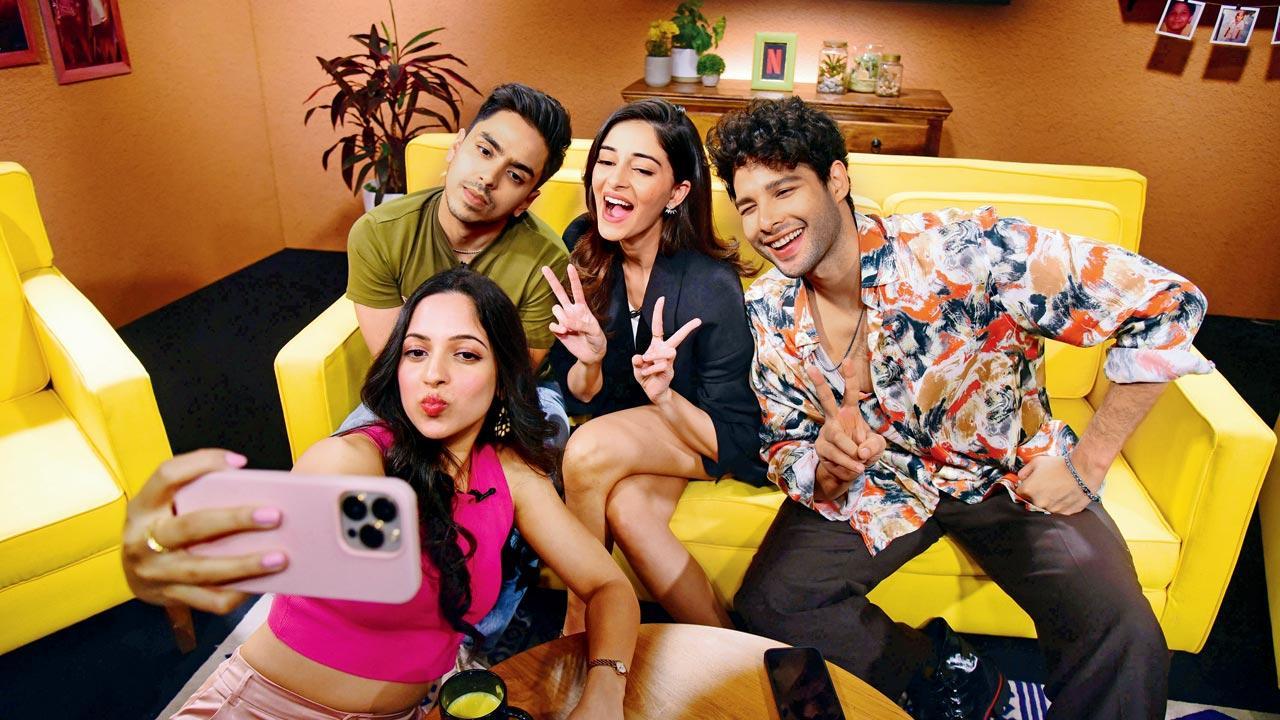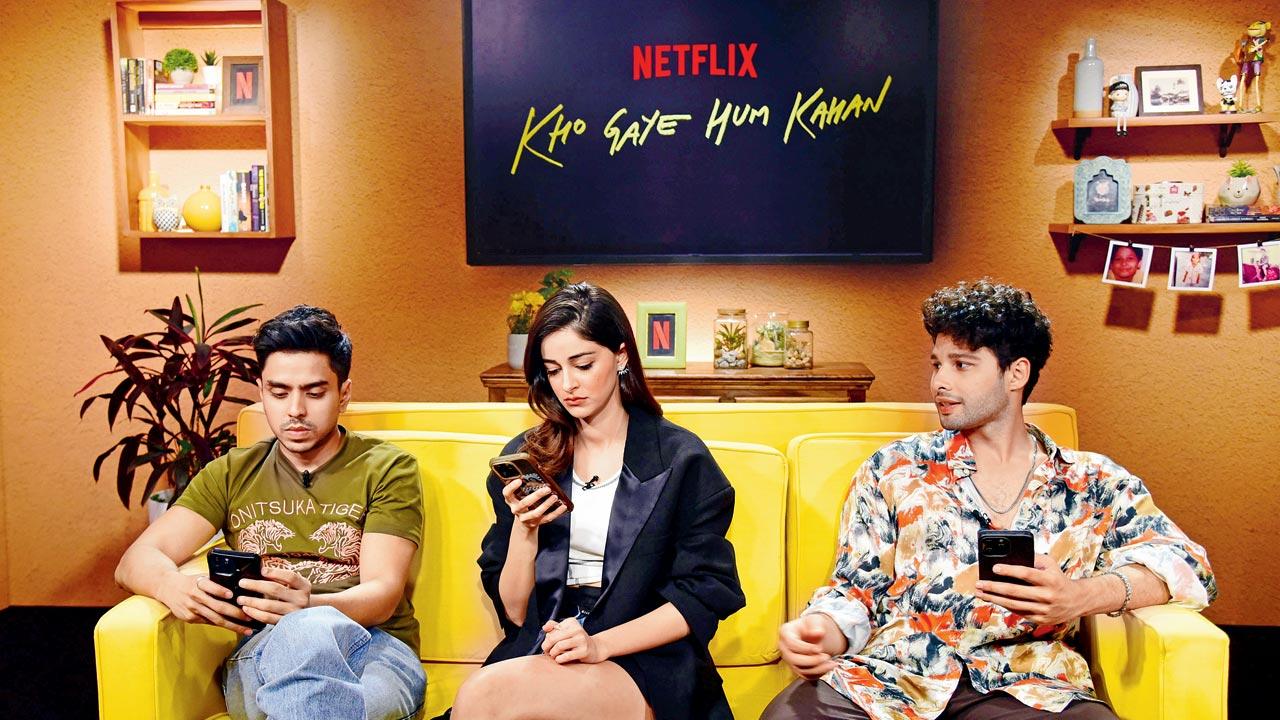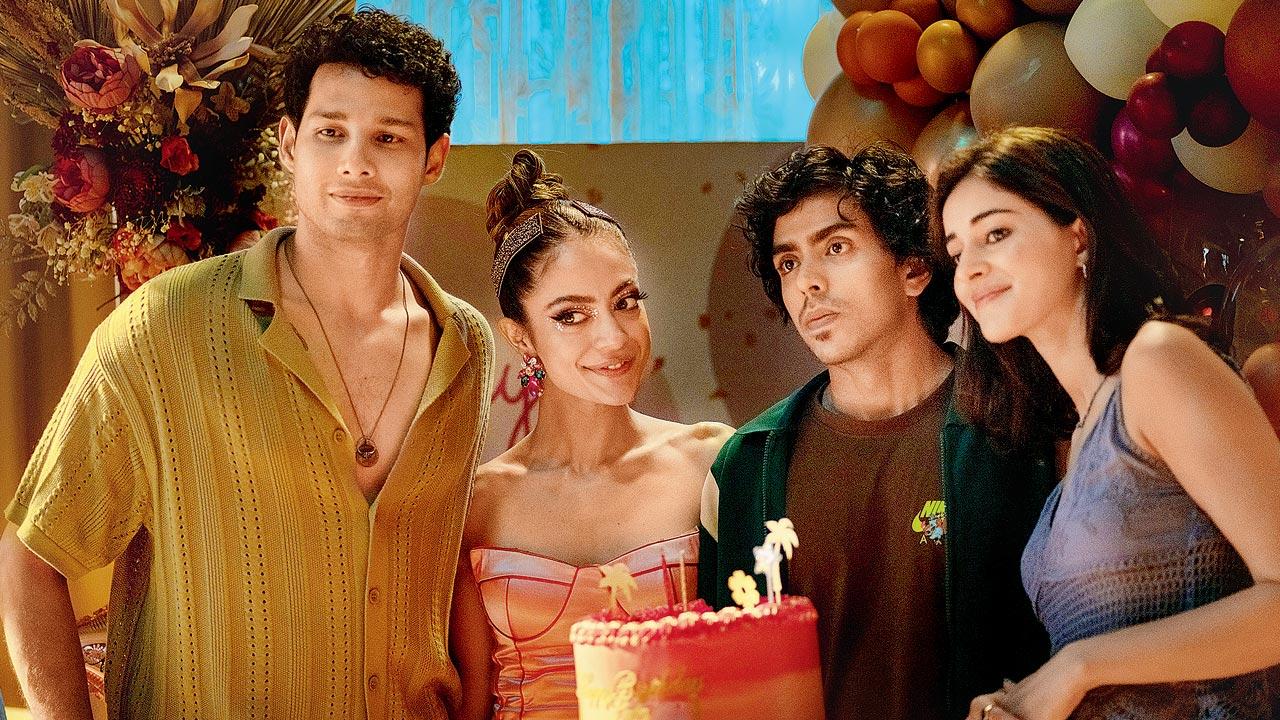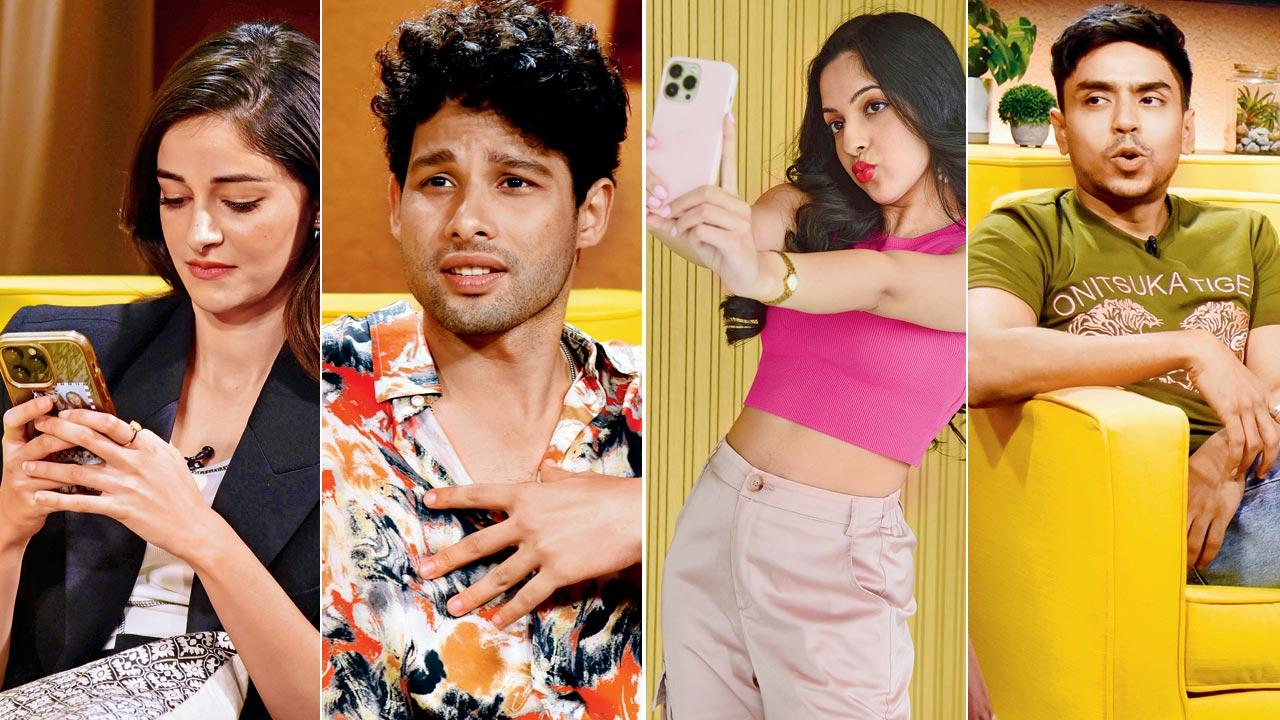In an exclusive interview with mid-day and creator Avanti Nagral—Ananya Panday, Siddhant Chaturvedi and Adarsh Gourav—come clean on being the generation that controls, and is slave to, social media

Adarsh Gourav, Ananya Panday and Siddhant Chaturvedi star in the upcoming Kho Gaye Hum Kahan, a film that explores the trappings of the digital age. Seen here with Avanti Nagral. Pic/Shadab Khan
We are at the Netflix office. The cast of Kho Gaye Hum Kahan—Ananya Panday, Siddhant Chaturvedi and Adarsh Gourav—who play Ahana (an MBA corporate professional in love), Imaad (a stand-up comic) and Neil (a fitness trainer)—are checking their phones and hair in between interviews. “I don’t even have to pretend for this photo,” says Pandey as she poses with her phone, typing away. The movie, which releases on Netflix on December 26, follows the lives of the three friends as they navigate work, love, self-worth—all while living in a world that is slave to social media. And so, we got creator, influencer and singer Avanti Nagral to sit down and speak to them about some of the major themes in the movie—stalking, comparisons, trolls, and identity. Nagral has a dual degree from Harvard University and the Berklee College of Music, and uses her social network to talk about gender and youth issues. What ensued was a “therapy session” as Chaturvedi put it.
Edited excerpts from the interview.
Avanti Nagral: So how’s life? Do you feel khoya hua in life right now?
Siddhant Chaturvedi: Actually, I haven’t felt so found before.
Adarsh Gourav: I feel like I always space out… every 10-15 minutes, I space out.
Ananya Pandey: What? I have been thinking you are such a good listener…

Adarsh Gourav, Ananya Panday and Siddhant Chaturvedi and
AN: Is your online personality similar to who you are offline? Where do you draw that boundary?
SC: I keep it private. I also feel that I don’t have much to show, I am boring! Everything is through my characters, through cinema. That’s how I would like to be remembered. Otherwise, I am a boy next door, ordinary.
AN: But you do share some thoughts with small snippets as @siddychats on Instagram.
SC: Yes! More than my pictures, I like to write so I share my thoughts. I validate my thoughts, but I also connect with the [ones in the] world who relate to them.
It’s a conversation through text. That’s the maximum I can go. There was a point when I was doing a lot—after my first film (Gully Boy). I was receiving a lot of love, and so I was like, let’s be out there. But I got done with it soon. I said no, I need to work on myself as an actor, and the more I keep myself private, I can do that. Anyway, we have so much competition from creators like you who are killing it. I can’t do that so well—the way you guys do. I have taken a back seat. I will talk to people through cinema; that’s my thing.
AP: I think the attempt has been to be as real as possible—without giving away too much of my personal life. But when I am on it, I am real. So many young girls come up to me and say they relate to me, and that’s a win. I have always owned up to my mistakes, and not been afraid to mess up, or say something wrong. I am like cool, I said the wrong thing, I will be careful next time.
AN: You had started a movement as well—Be Positive—what was that about?
AP: It was much of the same. Cyber bullying is so rampant but no one was talking about it at that time. Most people didn’t know how to deal with things—numbers you could call if you were being bullied at school or something. It was about starting a conversation.
AN: Kudos to you, Ananya. Adarsh, your first film was 13 years ago. You have been in the limelight… Did you have to work on your persona?
AG: I came into the limelight after White Tiger… I was more interested in being a singer before.
 Kho Gaye Hum Kahan, directed by first-time director Arjun Varain Singh, is an exploration of the lives of three twenty-somethings
Kho Gaye Hum Kahan, directed by first-time director Arjun Varain Singh, is an exploration of the lives of three twenty-somethings
AN: Do you identify as an artiste? Or do you feel an identity crisis as an artist and a person? Is there a separation between the two?
AG: You try to find yourself in every character you play, but I also try to play characters that are different from me. When life gets hectic, you can escape, and adopt another person’s problems. That’s exciting. I need to be constantly stimulated and get bored easily. Being an actor and singer fulfills all my needs.
AN: Even in the movie, social media becomes a form of escape and scrutiny. It’s a hard line because you have to find what is real and what isn’t. Have any of you ever stalked anybody? As a public persona, is it harder?
AP: It’s always easy!
SC: Unless you like someone’s picture as you are stalking…
AN: Maybe the hard line is keeping parts of your life personal. Do relationships feel unreal unless they are on social media?
AP: The more we keep our dating lives personal, the more real they feel. That’s one of the only parts of my life that I can protect; everything else is out there. Adarsh is very open about his relationship and comfortable doing that. I am somewhere in the middle—it depends on who you are with. It depends on the day too! Some days you want to scream from the rooftops, and some days you are like, no one can see this.
AG: There is not much to hide! It’s chill only.
AN: I had a really public relationship, and a public break up, so I am curious. As I was going through it, I realised how hard being in the public eye is. Do you think twice before you go on a date at a public place?
SC: All the time! I make sure that I do not. I do express myself on social media, and I do say what I feel bending the front of poetry. There is no name, no picture, and people can connect to it. I channelise my need for expression towards my partner in art so that other people can connect.

AN: Siddhant, you play Imaad— a stand-up comic who uses real life as material. Is there a line that one needs to draw while using inspiration from our own lives?
SC: There is an ethical and legal line for sure!
AN: Where is the moral grey zone?
SC: As an artiste, everything is always a grey zone. There is no black or white—and that’s where the fun is. There is no way to be preachy about it; you can explore as much as you can. Sometimes it may be wrong, but if I need to derive something from my life and out it through a character, I use it. For example, I don’t smoke [in real life], but in this film I do.
AG: (Laughs out loud)
SC: Okay, okay. For Gully Boy and this film, I had to start smoking. So, I did. And it’s hard to let go of that—and I am struggling with that. I am being honest. But whatever is needed for the character, I do it. Even Ananya had to.
AN: Yes. We were all given tasks for the movie—Adarsh had to build his body, Sid had to learn to [do] stand-up [comedy]. I had to smoke. And I couldn’t light a cigarette!
SC: There were so many bodily changes. Adarsh can speak about those...
AG: I kept farting! I had to eat so many eggs and have so much chicken! But after I stopped working out, I became dysmorphic. Before, I think about my body so much, but now I wonder why I am not as ripped as I was in the film. But I am not playing a trainer in my next movie. However, your mind gets so used to that beautiful image… it’s the best you have ever looked.
AN: As women, we experience body dysmorphia every day. Ananya, how do you deal with that?
AP: Before social media, it was school, where people would say you are too hairy or too thin. My only attempt is to be kinder to myself. When I started out, I was on a very strict diet. I would cheat on Sunday, and I would fall sick because I ate so much. I thought I had to look a certain way and was depriving myself. But I became kinder to myself. When I look at my younger sister, I never want her to feel the way I did, or for that matter, any young person. The only thing I can do is be positive about my body, and hope people get inspired by that.
AN: Which character from the movie did you all relate to the most?
AP: I related with Ahana. If you think I was natural, it was because it wasn’t acting. I miss Ahana. She helped me deal with so much that I was going through in my own personal life.
SC: For me, it was Adarsh’s character, Neil. The family dynamic he has in the movie, is very close to my own family. When I read the script, I called Arjun (the director) and asked him, how did you crack Neil’s character. He is from London, how could he have know all this? The details are so minute—that’s when I knew he was going to be a great director. My own character was great, but I choose characters that are not close to who I am in real life. I can’t play myself in a movie.
AG: It’s boring na!
SC: Yes, it’s boring.
AG: By the way, Ahana is not like Ananya at all. I related to Neil and my client in the movie, who never wants to work out.
AN: What do you want young people to take away from the film?
AP: Just go hug your friends, and don’t let go. Like, in a non-creepy way.
SC: Leave them eventually.
AG: Please celebrate your birthday with your family. Don’t abandon your birth givers.
SC: Just be yourself, guys. The world is very noisy. Just chill and be yourself. There is so much gyan on Reels anyway. Tum log bas maje karo.
 Subscribe today by clicking the link and stay updated with the latest news!" Click here!
Subscribe today by clicking the link and stay updated with the latest news!" Click here!










